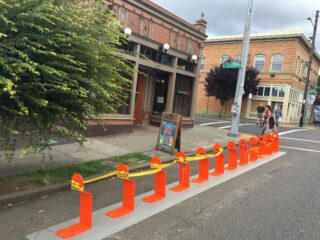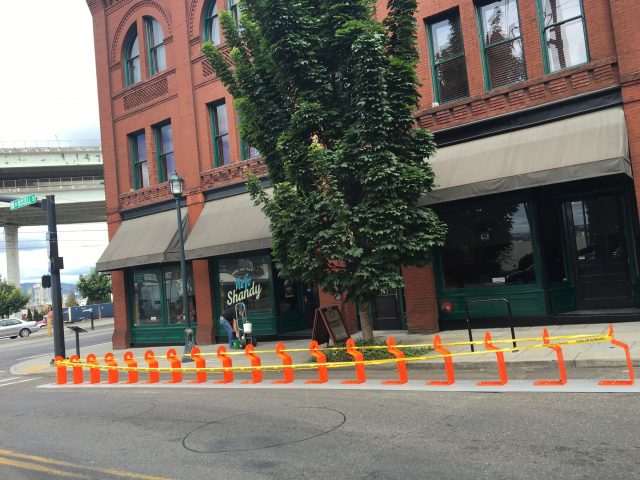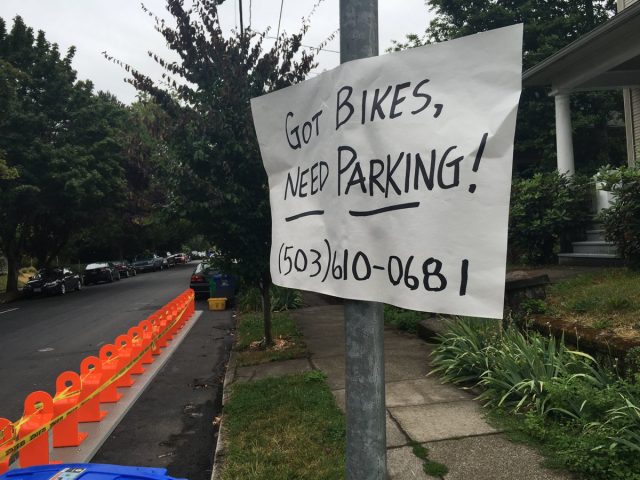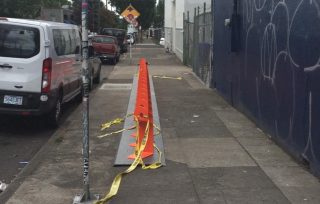
(Photo: J. Maus/BikePortland)
Besides the bikes themselves, the stations are the most visible part of the Biketown bike share system that’s set to launch six days from today. And not surprisingly, as the bright orange stations are installed on streets and sidewalks throughout Portland, their presence has stoked anger and confusion.
We’ve already covered the confusion: People are locking their own bikes to the racks which are intended solely for Biketown bikes. That issue is likely to disappear once the Biketown bikes show up next week.
Then just as that story died down a bit, we heard concerns from readers via comments that the City of Portland has torn out existing bike parking corrals in front of businesses and replaced them with bike share stations. Also yesterday, I fielded a call from a southeast Portland resident who was angry when she woke up, looked outside her house and saw that the space where she used to park her car was now a row of 18 Biketown racks.
What’s going on? Here’s what the city says…
Portland now has four fewer bike parking corrals

(Photo: J. Maus/BikePortland)
We’ve confirmed that the Bureau of Transportation has removed four bike corrals in order to make room for Biketown stations. The locations are: North Mississippi and Skidmore (at Prost); North Russell and Interstate (at Widmer Brothers Pub); NW 21st and Johnson (at City Market); and NW Thurman and 24th (at Dragonfly Coffeehouse).
According to PBOT Communications Director John Brady the decision to remove the corrals was based on conversations with business owners and an analysis of demand at the corrals and availability of nearby bike parking options. “In removing the corrals, our overall goal was to balance the needs of all users,” Brady said via email yesterday. “We will continue to monitor the situation, and we will revisit our decision if we find that it is warranted by the demand for bike parking.” If one of the businesses wants more standard bike racks on the sidewalk, PBOT is ready and willing to install them (note the the removed corrals and the new bike share stations were located in the street, not on the sidewalk).
Brady went on to say that the city still has over 3,000 bike racks within the Biketown service area map and more than 6,000 bike racks citywide. And for people who feel like the city should have kept the corrals and added the bike share stations alongside them, Brady added, “It is important to note that the demand on the public right of way in each of these locations is high. Our challenge was to balance the need for good parking with the need for Biketown stations and car parking.”
Want more bike parking? Brady says there’s an email address for that: bikeparking@portlandoregon.gov.
Advertisement
Welcome to the neighborhood, Biketown!

We’ve also heard directly from one Portland resident who says she and her neighbors are not pleased (at all) with the bright orange bike racks in the street in front of their houses. KGW-TV ran a story this week about a similar complaint.
As you might guess, residents of inner Portland who have seen tremendous growth in nearby commercial districts and lots of infill development are already highly stressed when it comes to parking spaces. Now they’re waking up and seeing strange orange bike racks where they used to park their cars.
We asked Brady to respond to these concerns. He stressed that all 100 bike share stations are being installed in the public right-of-way “which is shared space.” When PBOT and their contractor, Motivate Inc., chose station locations Brady said their goal was to, “balance the needs of the different types of travelers who use this shared space.”
As for the claim that Anderson and her neighbors were never notified, Brady pointed to the extensive public process PBOT started last spring. “We received over 4,600 comments on the station locations between the online interactive map and five open houses. In addition, we presented at over 40 stakeholder meetings and events,” he said. And while he acknowledges PBOT did not notify individual households, he says they did email every neighborhood association, district coalition, and business association about the project’s open houses. “We then hand walked a postcard to every business along all the main street corridors on the east side of the river,” Brady continued, “along with NW 23rd and NW 21st. To further communicate with the public, we issued a news release about the station siting process and the open houses. As a result, the planning process received widespread media coverage.”

(Photo: David G.)
Despite PBOT’s defenses, these stations are likely to continue to be unloved and highly scrutinized by some Portlanders. We’ve also heard from people concerned about stations placed on sidewalks where the bikes are likely to impact the walking and rolling (for wheelchair uses) space.
In my opinion, this debate is reasonable, worthy and completely expected. Make no mistake about it: Biketown is a new transit system that’s being overlayed onto existing infrastructure. It represents major changes to our city on many levels — both physical and mental. Add to that its hi-viz orange color and Nike branding (remember that just 12 years ago Portland residents firebombed Starbucks when it moved into inner southeast) and we shouldn’t be surprised that these changes will be uncomfortable for some people.
The good news is that Portland isn’t the first city to experience these bike share growing pains. In fact where the 66th city to go through it. And the wisdom of experience tells us that usually the pains subside dramatically once the system is actually launched and we have that collective “a-ha!” moment as happy people start pedaling around on shared bikes.
— Jonathan Maus, (503) 706-8804 – jonathan@bikeportland.org
Our work is supported by subscribers. Please become one today.

